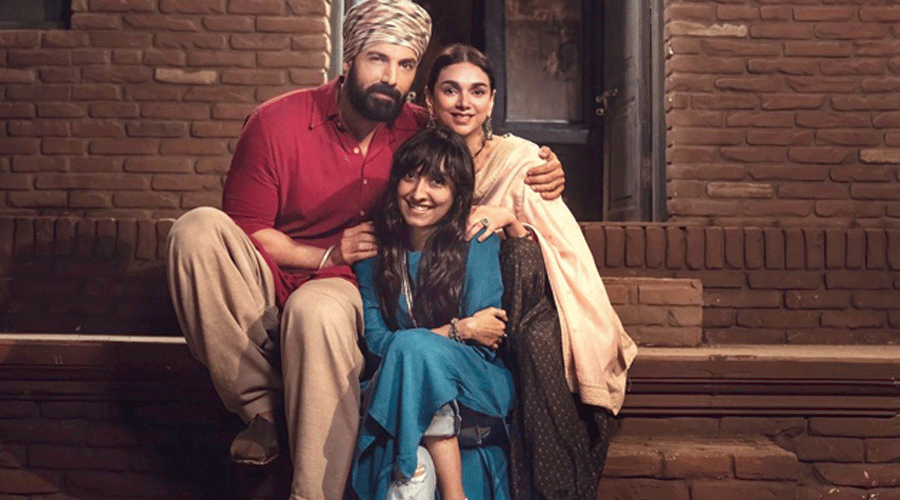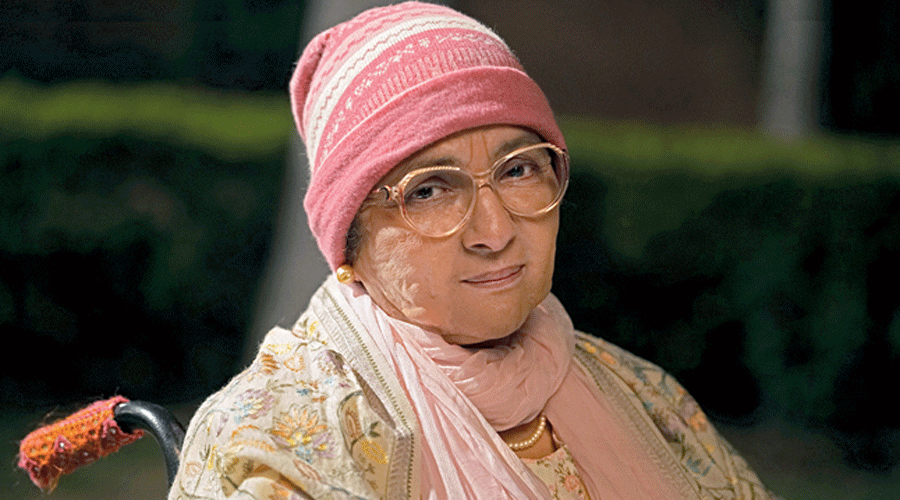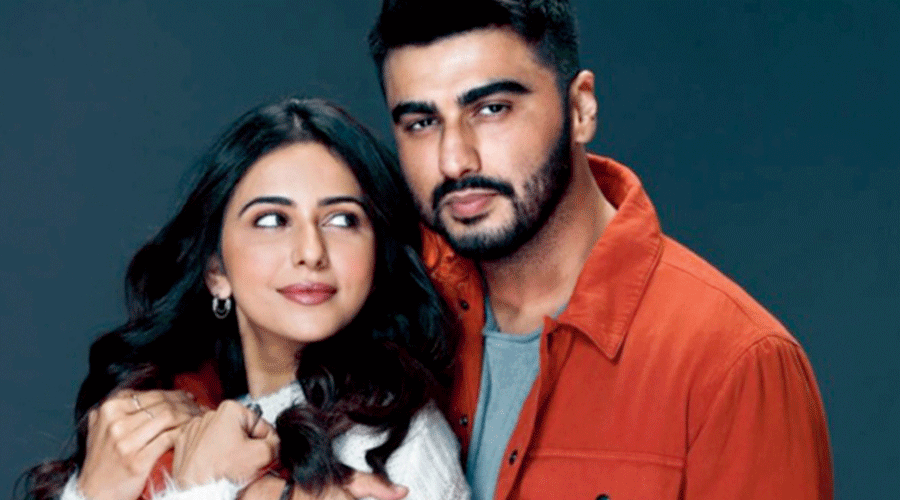Ahead of the release of ‘Sardar Ka Grandson’ on Netflix, The Telegraph chatted with actors Arjun Kapoor, Rakul Preet Singh, Neena Gupta and debutant director Kaashvie Nair on the world of their family film (in which a grandson travels from Punjab to Lahore to ‘bring back’ his grandmother’s old home), the crazy moments on set and what relationships mean to them.
The release of a comedy, and a film on family values, couldn’t be better timed, given what the everyday reality out there is like at present. Does the team agree?
Arjun Kapoor: I feel different emotions every day. Our primary job is to entertain people and make them disappear into a make-believe world for a few hours. We have to be grateful that we have a film that can transport people into a better mind space for a few hours. It’s a film that we hope will give them an emotional connect with their families, and a certain amount of respite and a positive outlook, at least for some time... a feeling of hope. On a personal level, of course, I feel whether it is something that I should think about right now? But then I remind myself that this is what we all work for... to make people smile. And if, at the end of the day, we can do that in our own small way, then I feel we should put this film out there with grace and dignity and by keeping the environment in mind. We can’t be silly and say that we have to be front-footed and promote the film.
Also, Netflix, as a platform, ensures the film longevity. We don’t have to rely on Day One or on the Saturday-Sunday collection. We are relying on spreading smiles over the course of the next few months. I strongly believe ki May 18 ko shuruaat hain and ultimately, it’s a film that will keep on giving over the next three-four months.
Rakul Preet Singh: We all know that times are not the best right now. All of us would have liked our film to come on the big screen. When we began shooting the film, that was the idea. Now we are just grateful that we have Netflix as a platform to be able to reach out to people and, as Arjun said, to bring a smile on their faces, in whatever little capacity we can. The times have brought all of us a little closer — whether it’s strengthening family ties, checking up on your friends more often or making that extra call to your parents or grandparents — and our film is also about celebrating relationships. If we can help people escape the grim reality and even if one person can have a genuine smile on his or her face, then our work is done.

Director Kaashvie Nair (centre) with John Abraham and Aditi Rao Hydari, who put in special appearances in 'Sardar Ka Grandson'. Sourced by the correspondent
Sardar Ka Grandson talks about the idea of belonging, home, roots and the agony of displacement. Was there a certain amount of relatability, given that we have all heard stories about the fallout of Partition, personal and otherwise?
Kaashvie Nair: Totally! We have all grown up hearing about Partition and about how people had to leave their homes. Even if we take Partition out of the equation, if you ask me personally, my grandparents’ house, which I grew up in, has today turned into a hotel. There’s a certain emotion that I feel towards that house — because my growing-up memories are all based there — and it correlated to the story of this film because everyone has that moment where you have had to move away from your childhood home at some point.
But the feeling of belonging, the memories and those roots can never be replicated anywhere else. That’s what really stuck with me when I was writing this story. Partition took too much away from people, and the emotions are universal in a way.
Neena Gupta: I have heard stories about our people wanting to go back, and vice versa... woh log (the people of Pakistan) bhi, they feel the same emotions. While shooting, I kept imagining ki kaisa hota hoga apne ghar ko chhod ke chale aana. I live in Juhu (in Mumbai) and I can’t even imagine someone coming up to me one day and telling me to leave not only my home, but also my country. Ek handbag uthaake chali jaaon aur kabhi wapas nahin aaoon! This is beyond my imagination.
Rakul: Both my sets of grandparents came from Pakistan, and I have grown up hearing their stories about how they used to have a house and they had to leave everything and come here. I have always wondered how difficult it must have been for them. When I heard the script of Sardar Ka Grandson, I was very touched because my Dadu always wanted to go back and visit his home there. But since my dad was an officer serving in the Indian Army, he couldn’t take him there. By the time my dad took his premature retirement, Dadu was a little too old to travel. But the stories he’s told us for years made me want to do this film.
Arjun: My Daadi now lives in the house where we all grew up. That home is called ‘Arjun’ (smiles). My Dada always used to joke with me saying, ‘Dekh, humne gate tere naam pe rakha hain, lekin ghar tere behen ke naam pe rakha hain’ (laughs). That’s what this film is. Grandparents essentially become kids when they get old.
We also have this history of our family migrating from Pakistan during Partition. So the connect to this script was very spontaneous to me because just being asked to move away from your foundation... there is always a lingering feeling of ‘what if’. And I think that feeling exists in all of us. What I appreciated about this film is that it’s modern in its thinking and philosophy, but it’s also about this boy (Amreek, played by Arjun) coming of age while he works towards fulfilling the wish of his grandmother (Sardar, played by Neena Gupta).
Also, we have family films, but very few films today give us an insight into the dynamics of a joint family. This film talks about that extensively, and the emotions of this film are universal. Politics aside, humanity exists on both sides of the border.
Neena, your Sardar is very bindaas. Is it the most fun, in recent times, that you have had playing a character?
Neena: Fun bhi tha aur bahut challenging bhi tha. This has been my most challenging role, physically and even otherwise. I had to change my whole body language, voice, face.... Lekin agar challenge na ho toh life mein kya mazaa hain? An actor always waits for that one challenging role. I can now close my eyes and play a housewife (smiles). This was a great experience because I hadn’t done something like this before, and I was scared whether I had played the part well. While the editing was happening, I would keep asking Kaashvie, ‘Over toh nahin kiya?’ She is very happy with me, but I don’t know whether my performance is up to the mark.
Neena had to don a huge amount of prosthetics for a film. I recently spoke to an actor who said that costumes are a mask for him. Do props and prosthetics play a big role in enhancing an actor’s performance?
Arjun: It varies from film to film. Like my film Panipat (2019), if I didn’t have the right costume, I wouldn’t know what that environment was like at that time. A film is the greatest lie that is sold as the truth. We are all creating a make-believe environment. So the more you can enhance that environment, the better. Before the take,
I knew that Neena ma’am is not my grandmother. But all the prosthetics helped her in behaving as my grandmother. Subconsciously, her performance filters down to me and gives me the feeling that she is a 90-year-old. My emotion attaches to her because I remember my grandmother and I see her in Neena ma’am’s performance, and then I engage with her. As cerebral as it sounds, it’s the most basic way of functioning and adds value to your performance and makes it authentic in that moment when the camera rolls.
Sometimes it’s prosthetics, sometimes it’s the simplicity of having an engagement ring on that reminds you of your relationship.... Anything helps... a detail that your director gives you, a prop or anything that as actors, you correlate and find a connection. We are all looking for a crutch. For this film, the crutch, when I signed on, was the relatability of grandparents. Costumes help, emotions help... these value-additions do help in enhancing one’s performance, for sure.
Neena: Fifty per cent of my acting is based on this. If I have the correct costume, I am more or less okay. I had to play a widow’s role in a film (The Last Color) and the moment I put on that white sari and went make-up free, I caught the character. Uske upar agar aapko sahi line mil jaaye toh you don’t have to do much.
Arjun: In my film 2 States, I had to wear glasses. The two films — Ishaqzaade and Aurangzeb — that I had done before that had been action oriented. Just the fact that I was given glasses for 2 States — which I used to wear as a kid in real life — automatically made me look a different way to the audience, and also made me feel different. Small things like that can also make a difference.
When the cast and crew of a film say, ‘We became like a family on set’, is it true or is it a cliche that’s over-exaggerated?
Kaashvie: If it’s not true on set, it won’t translate on screen like it’s supposed to.
Arjun: I have done films where I may not have completely loved the process, but the result may have turned out good. A film’s success doesn’t rest on the crew being a family on set. But it definitely makes the process way more relaxed. On this film, I made sure that everyone was relaxed on set because I was talking the most... like I am doing in this interview! (Everyone laughs)
I connected with Neena ma’am between breaks and Rakul and I would joke around... so that ease in front of the camera came on automatically.
Rakul: I always feel that the banter adds to improvisation. In the family scenes in this film, you will see a lot of improvisation. That Punjabi family vibe... that cannot be rehearsed.
Arjun: Our cameraman (Mahendra) Shetty saab also kept us all together all the time because he was so fast! There was a time when I wanted to use the loo and come back, but he was ready. So I have had to wait ki yeh aadmi thoda time de ki main bathroom toh ho kar aa jaoon! (Laughs) We had to be on set 24x7. We had no time to go to our (vanity) vans.

Neena Gupta as Sardar in 'Sardar Ka Grandson'. Sourced by the correspondent
Kaashvie: You’ve watched the film so you know... the last scene where everyone comes together at the dining table... that was literally the idea of this film. I told them to do what they want. So Rakul shutting her ears with her palms is actually for real! Her reaction was like, ‘What’s happening?!’
Arjun: We were all talking rubbish and trying to make sure we are all heard. That was the fun part... a Punjabi family where everyone wants to be heard! Indian families are, in general, so boisterous. Hindustan mein volume levels ka upper limit kitna hona chahiye logon ko pata nahin hain. We don’t understand the concept of whispering or silence (laughs).
Rakul: Woh Punjabi mein word hota hain na ‘raula’...
Arjun: That was actually an option for this film’s title, which I had suggested...
Rakul: Oh really?!
Arjun: Ya, it was shot down because I was told, ‘Nahin samjhenge log... bahut Punjabi type hain!’
Kaashvie, I believe on set you had to cut off a lock of your hair to use in an action sequence. Any other bizarre moments while making this film?
Arjun: I got bitten by a dog!
Rakul: When did that happen?!
Arjun: That scene in the film where I am supposed to be bitten by the dog, he actually bit me for real! Barood got carried away... he’s a method actor! (Laughs) Barood, which is the name of the dog, was shooting the whole day and he was tired and he was biting the body double for the close-up shots. They kept the wide shot for the end since the light in the evening is very good. So when they would say, ‘Barood, bite’ it was his cue to bite... but he didn’t realise it was me. But once he bit and saw my leg had no packing, he released my leg immediately and came and stood next to me. He knew he had made a mistake because he had become my friend. He literally left a ‘mark’ on me! (Laughs) He’s a very sweet dog...
Arjun, no sweet dog will be called Barood!
Arjun: Trust me! He was actually very docile. Kanwaljit (Singh) sir was most scared of him. There was a scene, which Kaashvie hasn’t retained in the film, where Barood barked at me and Kanwaljit sir went scurrying. So I told him, ‘After Satte Pe Satta, this is the maximum you have danced in a film!’ (Laughs) Also, I must tell you we have shot so much for this film... at least 75 days worth of material! Pandrah-bees din toh main sirf truck hi chala raha tha!
Which is your favourite Bollywood family film? Tell t2@abp.in










